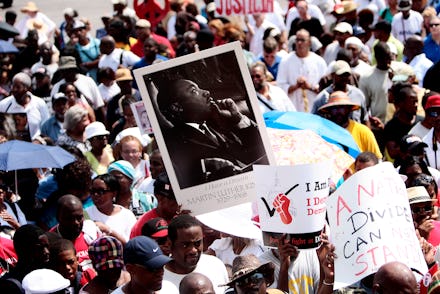#ReclaimMLK Reminds Us of Martin Luther King Jr.'s Real Legacy We Should All Remember

Martin Luther King Jr. was more than just a dream.
The #ReclaimMLK campaign, inaugurated by the founders of Black Lives Matter, aims to remind the world that the slain civil rights leader was far more than the voice behind the famous "I Have a Dream" speech delivered in Washington in 1963. Born out of a fear that King's memory has become a sanitized version of the historical person, the #ReclaimMLK campaign dedicated the five days between King's birthday (Jan. 15) and today's federal holiday to acts of civil disobedience in his name.
History has been almost cruel in its kindness to King. American media's lionizing of the civil rights leader — in full force on Martin Luther King Day — has effectively whitewashed MLK, portraying him as the humble preacher of nonviolence, rather than portraying him as the anti-capitalist and anti-imperialist political dissident that made him an icon in the first place.
The #ReclaimMLK campaign exists to shatter the white-bred illusions that have, as Selma director Ava DuVernay put it, "reduced [King] to a catchphrase, four words: 'I have a dream.'"
Who was the real King? Established by the federal government in 1983, Martin Luther King Day transformed a previously recognized "Day of Service" into a memorial and a reminder of the black struggle for civil rights in America. Yet the holiday name seemed wildly disconnected from the historical man, whose own radical activism was conveniently lost in the annals of mainstream "history."
As DuVernay noted in an interview with the Atlantic, there had been no film, biopic or television special solely dedicated to Martin Luther King as the center of the civil rights movement, a portrayal that would have captured a complicated man embodying complicated politics: "Nothing's been shown. ... The man was a radical! He was a visionary. He was brilliant and complicated, he had an ego, and he was unsure."
Just like his memorial in Washington, D.C., King's legacy has been locked in stone. He became a symbol of peace devoid of rebelliousness that defined his life of activism, of the protests and boycotts that totaled 30 arrests in the course of his life. He was a vocal dissident of capitalism and gave contentious speeches like "Can a Christian Be a Communist?" at during the time of the Red Scare and when McCarthyism pervaded America. He spoke out against America's imperialism and, specifically, its involvement in Vietnam.
And this is a problem for members of Black Lives Matter: Because of what the holiday has become, it is as if King's actual life — it's complexities, mistakes and compromises — do not matter in the grand scheme of history. Instead, as Black Lives Matter co-founder Alicia Garza asserted, "people want to neutralize" the holiday and, in turn, neutralize the man.
Why it matters: With the absence of historical narrative or media focus on King, what he's become in the American cultural landscape is a cipher, an empty catchall and symbol for white Americans to project all of their emotions about race relations onto, as the #ReclaimMLK campaign suggests. Indeed, he has been converted into a kind of white "dream" for the hope of nonviolent, peaceful change that results in racial equality in ways that make white people comfortable.
This is the version of King's history that the majority in power would like you to remember. But, as the Root's Danielle Belton explains, this wasn't King at all: "Calling out the ills of racism, capitalism and the Vietnam War didn't involve any of the warm fuzzies that revisionists have assigned to King by solely focusing on the fantastical end of his famed speech."
King was assassinated for a reason: He was considered a threat to the white-dominated social fabric of America. He was considered so dangerous a radical that, in 1964, King received an anonymous letter written by the FBI that threatened to reveal King's true character to the American public as an "evil, abnormal beast" and attempted to persuade the civil rights leader to commit suicide.
Black Lives Matter and its supporters are resisting this whitewashing. People have taken to social media to share stories of MLK under the hashtag #MLKAlsoSaid and to spread the word about #ReclaimMLK. The result proves that MLK was anything but Santa Claus.
By reclaiming King and his legacy, the Black Lives Matter movement is not only proving the relevancy and strength of their work to the world, but reinforcing a historical continuity in the name of justice, activism and equality.
"What we have learned from Dr. King's words and our current practice," wrote Garza and her BLM co-founder in an op-ed about the campaign, "is that when a movement full of leaders from the margins gets underway, it makes the connections between social ills, it rejects the compromise and respectability politics of the past, and it opens up new political space for radical visions of what this nation can truly become."
h/t The Root